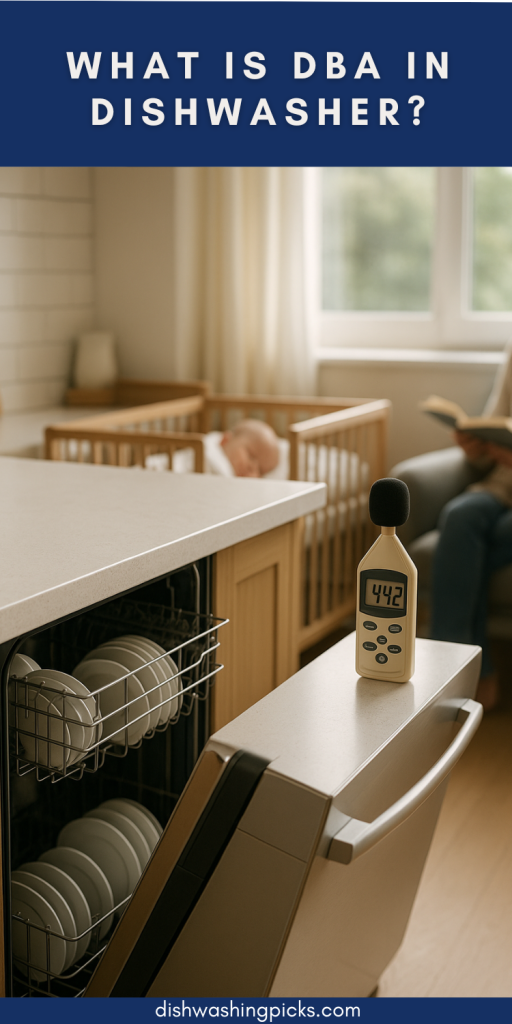
Ever been scrolling through dishwasher specs or manuals and stumbled on “DBA” and thought, “Wait, what’s that?” You’re not alone. It sounds like some techy code, but don’t worry—it’s actually pretty straightforward.
DBA stands for Decibels A-weighted. Yeah, a mouthful! But basically, it’s a fancy way of measuring how loud your dishwasher is when it’s running. Think of it like the volume level, but for your appliances.
Imagine this: you’re settling in for a chill evening, but your dishwasher sounds like a jet engine taking off. Annoying, right? That’s where DBA comes in—it helps you pick a quieter machine that won’t ruin your zen.
But how loud is too loud? What DBA number should you look for? And does a quieter dishwasher mean it’s better? Let’s unwrap that next!
How Is DBA Measured, Anyway?
So, how do they actually figure out the DBA number? Great question!
Decibels (dB) measure sound intensity, but the “A-weighted” part means the measurement focuses on frequencies the human ear is most sensitive to—so it’s not just some random number. Sound experts use special equipment to gauge noise levels in a controlled setting.
For dishwashers, manufacturers test how loud the machine is during typical wash cycles. The result? That DBA figure you see on product specs.
Think of DBA like a volume knob, but instead of 1 to 10, it’s a scale where 0 is total silence (nice!) and everyday sounds like conversation hover around 60 dB. Dishwasher noise usually sits between 38 to 60 dB—quite a range, right?
What DBA Numbers Should You Look For in a Dishwasher?
Okay, here’s the juicy part—what’s a good DBA rating for your dishwasher?
- Under 45 dB: Whisper quiet! At this level, your dishwasher hums along so softly, you might not even notice it’s on. Perfect if you have an open-concept kitchen or do late-night dishwashing.
- 45-50 dB: Still pretty quiet. It’s like a soft background noise—think library-level quiet with a bit of hum.
- 50-60 dB: Getting louder, but still manageable. It’s similar to a normal conversation. You’ll definitely hear it, but it’s not disruptive.
- Over 60 dB: Now, that’s noisy territory. This might sound like a vacuum or hairdryer and can be distracting if your kitchen is close to living or sleeping areas.
Imagine hosting a dinner party—would you want your dishwasher to shout over the conversation? Probably not. So, a lower DBA is often a better pick for peace and quiet.
Does Quieter Mean Better?
Here’s a question I bet you’re wondering: “If a dishwasher is quieter, does that mean it cleans worse?”
Not necessarily! Technology has come a long way. Many modern dishwashers balance noise reduction with powerful cleaning performance. Some brands invest in insulation and improved motors to keep things quiet without sacrificing clean dishes.
But—word to the wise—always check reviews and cleaning ratings too. A super quiet dishwasher isn’t worth much if your plates still come out dirty.
Quick Tips for Choosing a Quiet Dishwasher
- Look for DBA ratings: Check the product specs or user manual. Lower numbers are your friend.
- Check for noise-reduction features: Some models advertise things like “quiet wash” or “sound insulation.”
- Consider placement: If your dishwasher shares a wall with a bedroom or living room, quieter models make a bigger difference.
- Read user reviews: Real-world noise levels can vary, so see what others say about noise.
Wrapping It Up: Why DBA Matters to You
At the end of the day, DBA is your noise scorecard for dishwashers. It helps you pick a model that fits your lifestyle—whether that means whisper-quiet washing while you binge-watch your favorite show, or no big deal about a little extra hum.
So next time you shop for a dishwasher, keep an eye on that DBA number. Your ears—and your peace of mind—will thank you!
